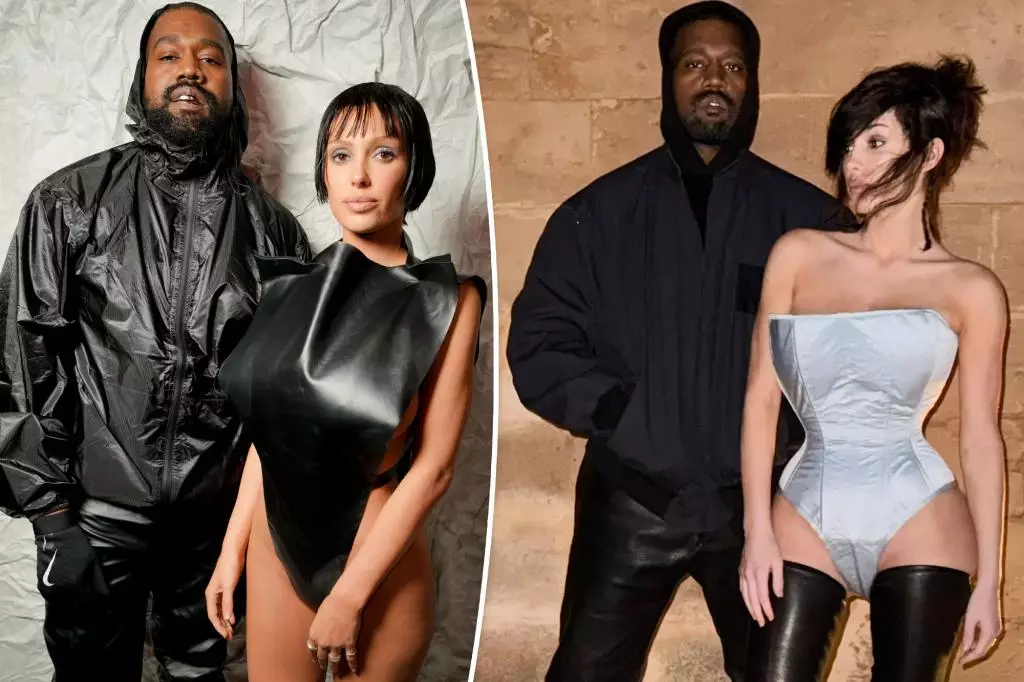In today’s media landscape, celebrity relationships are often under intense scrutiny, with every detail dissected by fans and critics alike. One of the most captivating, yet bewildering dynamics is that between Kanye West and Bianca Censori. Recently, West has been vocal about his relationship with Censori, reigniting discussions about power, control, and the nature of contemporary romance. His recent declarations and social media activity reveal a complex interplay of affection and hierarchy that raises eyebrows, prompting a fresh examination of what it means to be in a partnership within the public eye.
The Nuances of Control in Relationships
Kanye West, a figure synonymous with controversy and artistic genius, has made headlines once again by proclaiming himself “master” of Bianca Censori, his wife who has been both his romantic partner and a lightning rod for speculation. His endorsement of a fan’s comment that praises Censori’s perceived loyalty and compliance, further fuels the narrative that relationships, especially in the spotlight, often hinge on power dynamics. The juxtaposition of love and dominance reflects an unsettling reality: can such a relationship be empowering for one party while simultaneously diminishing the other?
This troubling question is accentuated by West’s past statements, where he claimed to have “dominion” over Censori. These statements can be perceived as both a declaration of commitment and an alarming assertion of power. Despite being a billion-dollar mogul, the language surrounding this dynamic is fraught with implications, such as the notion that Censori’s public persona is crafted around his authority. Is her expression of individuality truly her own, or is it tethered to the expectations imposed by her partner?
Public Rants and Private Struggles
The saga unfolds amidst a backdrop of West’s increasingly erratic behavior—a trend characterized by public rants that alienate many, including notable figures in the music industry. For instance, his comments regarding Beyoncé’s children and the subsequent outcry illuminate a man trapped in a cycle of provocation and backlash. His admission in recent lyrics about Censori leaving him due to his shocking remarks highlights the tumultuous nature of their relationship. Can a partnership thrive when one partner’s actions threaten to fracture the bond with public controversy?
Moreover, the reversal from stray remarks to reconciliation feels paradoxical, emblematic of an oscillating power structure where emotions are as volatile as public perception. This dance between public appearances—like their dinner dates and visits to unassuming stores—against the backdrop of personal crises reveals an intricate tapestry woven from intimacy and public spectacle. Their reunion can be celebrated, but it simultaneously begs the question: are they truly aligned as equals, or is one a puppet to the other’s whims?
Reactions from the Influencers
The reactions to West’s statements and their implications have sparked heated discussions. Notably, Milo Yiannopoulos rushed to the defense of Censori, labeling the claims of her being controlled as “absurd.” His assertion that Censori is the “guiding creative intelligence” seems to be an attempt to shift the narrative, yet his admission that West is the “final boss” complicates that perspective. This characterization raises concerns about the very notion of independence within a relationship defined by public influence and expectations.
This discourse exemplifies a broader cultural conversation about gender roles and partnership dynamics. It forces audiences to wrestle with the implications of celebrity life: how often is the personal intertwined with the performative? In a world where the lines between control and consent are blurred, the narratives young fans absorb from these couplings shape their understanding of relationships.
Societal Repercussions and the Celebrity Effect
What West and Censori represent extends beyond their personal stories; they are symbols of larger societal patterns regarding masculinity, dominance, and what it means to yield to a partner’s influence. The adoration and criticism directed toward them inadvertently mold the views of millions who watch, aspire, or relate to their experiences. Thus, what seems like a trivial celebrity squabble holds profound significance and serves as a microcosm of societal ideals about loving partnerships.
While it’s easy for outsiders to dismiss the intricacies involved, the truth is that celebrity relationships mirror and often amplify the struggles inherent in personal connections. Emerging from such a relationship, Censori’s agency remains an area of speculation. Observers must consider whether she truly possesses autonomy or if her character has morphed into something defined by West’s public persona. These questions and dynamics force us to confront uncomfortable truths about men, women, and love in a world dominated by performance rather than authenticity.

